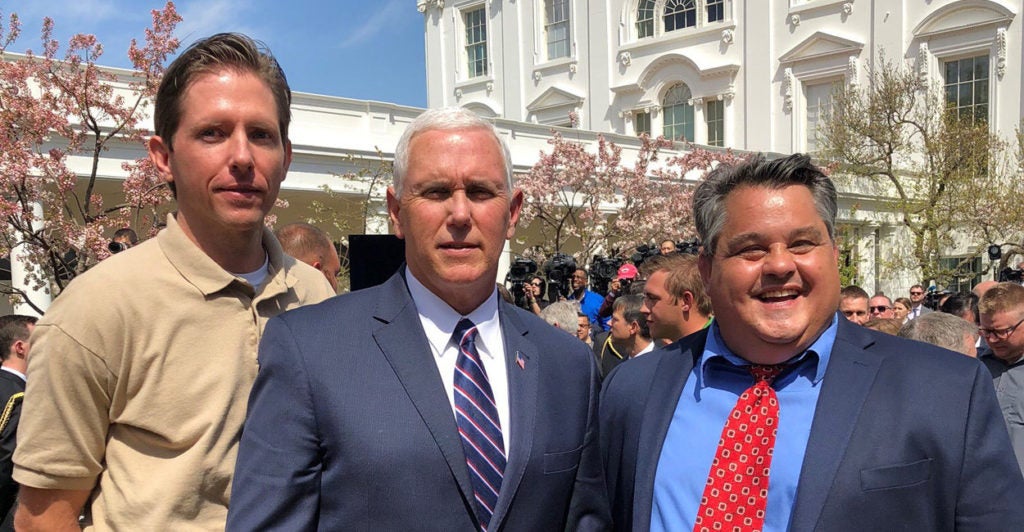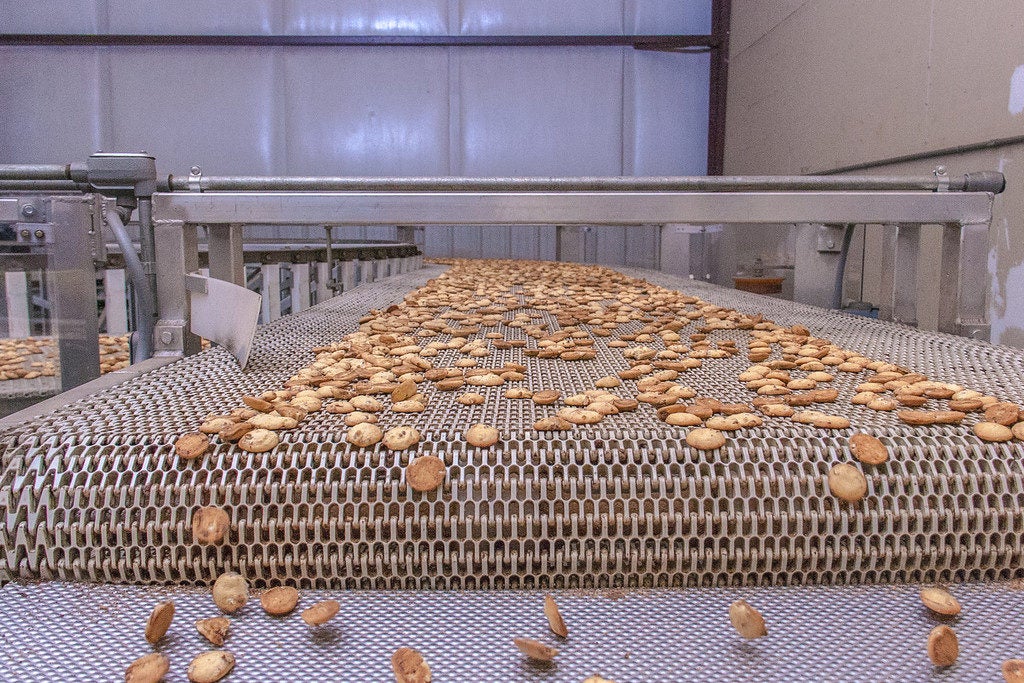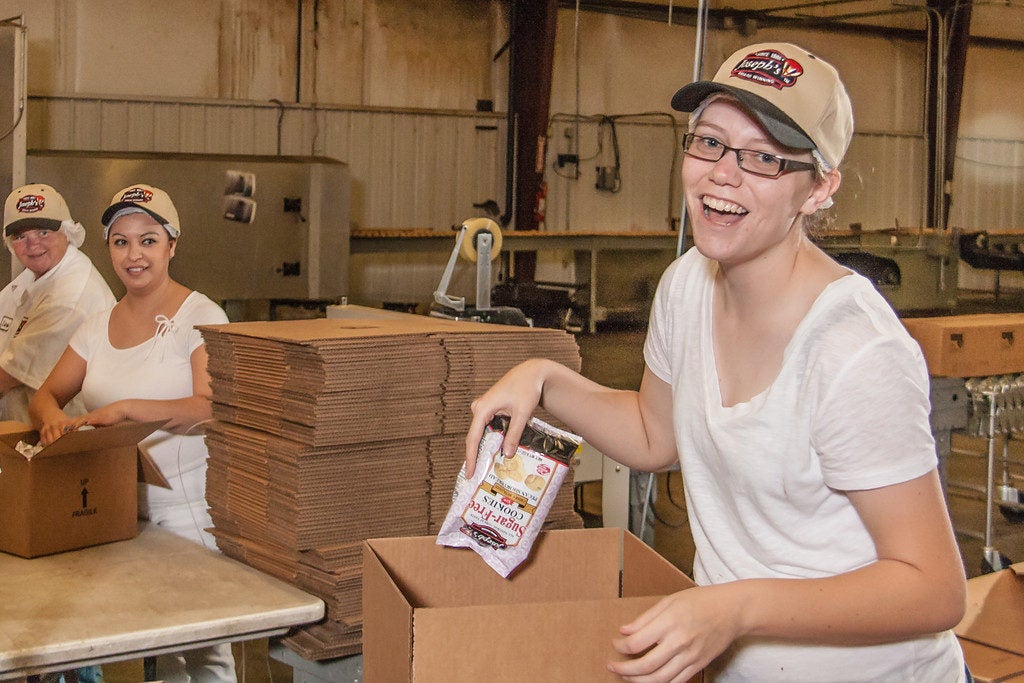The American economy has had a strong year. How much of this can we attribute to the federal tax reform passed in 2017? Ahead of this Sunday’s second anniversary of the Tax Cuts and Jobs Act, The Daily Signal is featuring several interviews about the law and its impact. We begin with Joseph Semprevivo, founder and CEO of Joseph’s Lite Cookies. The Daily Signal previously told his story and he’s back to explain how tax cuts not only benefited his cookie business but also Americans as a whole.
We round out today’s show with six individuals who spoke to The Daily Signal exclusively at the U.S. Treasury Department this week. They include economist Stephen Moore, a visiting fellow at The Heritage Foundation; Michael Faulkender, assistant secretary of economic policy at the U.S. Treasury Department; Christopher Netrum, vice president of tax and domestic economic policy at the National Association of Manufacturers; Ken Bentsen, president and CEO of the Securities Industry and Financial Markets Association; John Kartch, vice president of communications for Americans for Tax Reform; and Adam Michel, a senior policy analyst at The Heritage Foundation.
Read the lightly edited transcript of my interview with Semprevivo, posted below, or listen to the podcast for audio of all the interviews.
Rachel del Guidice: We’re joined on The Daily Signal Podcast today by Joseph Semprevivo, who is the founder and CEO of Joseph’s Lite Cookies. Joseph, thank you so much for being with us today.
Joseph Semprevivo: Thank you so much for having me. It’s been a very interesting journey in my lifetime. The cookie company was started when I was a little boy diagnosed with diabetes at the age of 9. And at that time, my mom and dad had a restaurant and they went away on their very first vacation, we came back, and the restaurant was empty. The manager stole everything they had. They went bankrupt and here I am, a little diabetic boy, watched my parents struggle, lose everything.
At this time I’m about 11 and a half years old and I decided one day I wanted to make a difference. …
My dad was a cook, my mom was a waitress at the Holiday Inn, and they decided to open up another restaurant and they were talking to me and my dad said, “I want to make an ice cream and serve it to everybody.” And I said, “Geez, I want to make a sugar-free one,” so I went to make a sugar-free ice cream.
I’m selling it to 197 stores. And then one day after freezers broke down at a store and we had to throw everything away, I asked my parents, “Could you make me a cookie?” And they did. And I fell in love with it. It was the first sugar-free cookie I had since I was diagnosed.
I’m now 15 years old and [watched] my parents skip meals. … I remember very vividly, we would sit down for dinner and my mom and dad would never eat and I would say, “Mommy, daddy, why aren’t you eating with me?” They’re with us—my brother and sister and I—and, “Oh, I ate when I was cooking.” And that was all because they didn’t have enough money to pay for my insulin.
So they had to skip meals, save on food costs, so they could pay for my medicine being I was a diabetic. That’s always stuck in my head very vividly.
So then I jumped in and we were making cookies and I’ve been doing that now for 33 years and sugar-free pancake syrup and all these other products that we’re getting to share this product across the world.

del Guidice: That’s really incredible. Thank you so much for sharing that story. So you mentioned that your business is more than cookies. You mentioned the pancake syrup. Are there any other products that your company makes? And also, how big is your company? How many folks do you have working there?
Semprevivo: Total company, we have seven people that work for the company.
del Guidice: Wow. And you do so much with a … pretty lean staff.
So, you’re no stranger to The Daily Signal. We’ve actually covered your small business and how you supported Republicans’ tax reform package that went into effect in January of 2018. And that tax package, for people who might be a little rusty on everything that it did, a few things it did was reduce the federal corporate tax rate from 31%, 35% to 21%. It also repealed the corporate alternative minimum tax.
So two years down the road, Joseph, looking at what your life and your business climate was like before tax reform to now two years later, how would you say tax reform has impacted your business?
Semprevivo: It’s given us more freedom more so than anything—the cash that was freed up rather than sending money to Washington, D.C., and having to budget for that money every single year. I look at it as if you have a dollar and you added that dollar, you have to put away 30 cents every year in this bucket just so you could pay your taxes 12 months later. That’s money being taken right out of the economy.
What these tax cuts allowed us to do was to put that money to work, invest back into equipment, invest back into our team members. We expanded our syrup company. We had a total of seven employees.
We expanded our syrup company. We only had one person in the syrup company. We now have 11 in the syrup company. We opened up another business, a real estate brokerage firm from the free funds that were released. We hired 16 people in that company. I just created another product line that is not related to food and that gets launched in 2020. Created another small business. We’ll have about three employees, three to five employees there.
So this has just completely given us freedom to expand, to hire more people, more middle-class taxpayers and upper-middle-class taxpayers. They’ll earn great wages and they’ll work hard and contribute to society and the economy.
del Guidice: Well, that’s incredible. Looking at what happened with tax reform, are there any specific elements to the package that you say were specifically effective? If there was one or two things you could pull out of everything that happened, is there one thing where you’re like, “This was the most helpful to us”?
Semprevivo: To me it was more of a simplification of the tax code. And I know in everything that you read out there, people are saying it’s more complicated. It’s actually simpler to do our taxes this year.
And there was a specific section, Section 199A, where in pass-through companies, which is 60 million … We figured what? 30.2 million small businesses that employ almost 60 million people in the country. They’re pastors. They get to take advantage of 199A, which means there’s 20% …
I like to look at it this way: 20 cents on the dollar of qualified income is freed up. Twenty cents on the dollar. So that business gets to employee 20 cents on the dollar toward a marketing to hire new people to give new raises. Small businesses struggle to keep people. So guess what? We’re throwing money at our team members to keep them. We can’t afford to lose them. So their wages are going up pretty aggressively, whether that’s through bonuses and raises and higher starting pay. It’s really a beautiful thing what’s been happening.
So the total of the package is wonderful. I like 199A because it freed up 20 cents on the dollar for small business owners in the United States. So that’s what I love about it.
del Guidice: So last July, I think that was when we last spoke for reporting I was doing on tax reform, you had specifically mentioned that you were able to hire five additional employees, you gave raises to your employees, and you were able to expand overall production. How did your employees react to those raises? Are there any specific stories that you can pull out? Remembering what happened and how they reacted to be able to get a pay raise maybe for the first time in awhile?
Semprevivo: Oh, absolutely. So I went to Mike, one of our team members for a long time, and I said, “Here’s your raise.” And the raises were between $3,000 and $5,000, and I’m just rounding down and up, but between $3,000 to $5,000. It depended on years of service and everything else. That was per year, and it’s ongoing still today.
Mike has two little babies, two little girls, and his car was getting a little beat up and getting miles, not as dependable. He went out because of the raise and bought a car for his wife to drive, so he knew his three girls, his wife and two babies, were safe. And this car was made in Michigan.
And this is what I love about this, it was made in Michigan, so the auto manufacturer, the union members made money. It was transported to Florida. So the truck driver made money, the auto dealership made money. The salesperson got his commission for selling the car and the insurance company salesperson made money.
All this money stayed in the United States to help stimulate the economy and he feels gratified and happy that he’s providing for his family. That was one example.
Another one, Linda went out and bought a home with her raise. That extra $290 a month, $300 a month that she received was the difference that she needed to be able to buy a home.
Now you have somebody buying a home. The supplies were harvested and created in the United States, the laborers from the United States. And Linda gets to live in this brand new home built in her town and all because of the Republican President Trump tax cut. An amazing thing and it’s affecting so many people’s lives.
And then look at the 16 people that I just hired in this new company and the other three that I’m going to be hiring in the other firm and 10 that we added for the pancake syrup company with a new factory, by the way. So 50,000 plus 50 to 100,000 square feet. So this is all new things, all new investments made in our country. It’s amazing.

del Guidice: So you had mentioned overall expanding production. You just mentioned now the new factory, adding people to the syrup company that you all have. What has that meant? Are you not only adding new people, are you also making new kinds of cookies? … What has that looked like for you guys?
Semprevivo: We were able to really focus our energy on our pancake syrup company because the freed up capital, that extra money, we really put to marketing our sugar-free pancake syrup. … That extra marketing over the last couple of years, … or since 2018, that enabled us to grow the sales. And I’m talking 30% growth rate since this tax cut has come into effect. And we’re going to probably end this year at a 32% to 35% growth for our sugar-free pancake syrup.
So we decided to invest more money into the pancake syrup company and grow that. We have sugar-free pancake syrup, peanut butter, and coffee. So we’re putting our energy into that and that’s where the new factory is and that new factory is in Florida. So we’re really excited about that project and it was all because of the tax cuts.
del Guidice: … Speaker Nancy Pelosi and some other Democrat leaders dismiss tax relief as insignificant, with Pelosi ridiculing what Americans got as “crumbs.” And as someone who has been directly impacted by these “crumbs,” how would you respond to her assessment of tax reform?
Semprevivo: It just shows us how out of touch Nancy Pelosi is and the Democratic Party is with the hardworking, middle-class Americans. I mean, I’ve been there. I watched my parents skip meals. I’ve seen what it was like, the struggle, not to have enough money for medication and then just belittling, “Oh, it’s only $3,000 a year or $1,800 a year. People get to put in their extra back into their pocket.”
Well, that $1,800 … or $3,000 is a difference between paying your electric bill one month and not or being able to buy groceries for your children. It makes a big difference in people’s lives. Buying cars, being able to buy a home, your first home at the age of 68 years old. I mean, these are huge things.
Nancy Pelosi and the Democratic Party [are] way out of touch. They cannot relate to the everyday person. They say they can, but these types of comments about, “They’re just crumbs,” just shows you that the proof is in the pudding, that they really don’t know what it’s like to struggle and be an average everyday American. And I’m ashamed. I’m ashamed of that comment.
del Guidice: Some liberal politicians, this is also very surprising given the success you’re talking about, it doesn’t seem like they appear to recognize it, but they’ve suggested that they would—if given a chance—repeal some or all of Trump’s tax cuts. How would that affect your business if that ever happened?
Semprevivo: Well, what would definitely happen is the raises would have to be removed and people would have to lose their jobs, factually speaking, because we would have to start taking the money from the economy and holding it back into the bank account.
So from a budgetary standpoint, we’re going to be losing all those funds, which are all these jobs that have been created would be reversed. And that’s just not true for my company. This is across the board.
I’m seeing expansion at businesses all across the United States, small business owners that I know and they would have to do the same thing. They’d have to lay off people. They’d have to close buildings. …
I’m hiring 50 people in my real estate company. I have 16 now. I’m hiring 50, opening up multiple locations, and I would cease expansion altogether and I’d have to look at alternative ways to save money and that’s going to be even wage cuts and downsizing.
del Guidice: So hypothetically speaking, looking back, had tax reform not happened, had Republicans not lead on that, what would the outlook of your business as well as your employees’ lives look like today? I know you mentioned the story of Mike and him being able to buy a car for his wife so that she’d be able to have a dependable vehicle to drive around while he was at work. What would it have looked like had tax reform not happened?
Semprevivo: Well, that’s a fantastic question. We experienced eight years, prior to President Trump, eight years of uncertainty between regulation and taxes. And we were really frightened. I mean, we tightened the purse strings, our sales, their growth rate was not the same as it was pre-Obama. And our growth rate now is parabolic. It’s like a rocket when 30% to 33% will end up year end. Thirty percent last year. I mean, the growth is just phenomenal.
I’ll tell you, those eight years, I saw enough. We had to really hold back and draw close our purse strings.
And if we didn’t have these tax cuts, I don’t really know if we would be in business today. And I’m very serious when I say that because we were scrimping and saving at every corner because [of] the uncertainty.
We felt that even with our customers when they would call in, “Well, you know what, I better not order for all my stores and distribution as much as I did eight years ago, nine years ago.” Now they’re saying, “You know what, give me an extra 35%, 40%, 50% on the cases.” And some are saying, “Give me an extra 10% on the cases, 12% on the cases.”
So they’re increasing their orders across the board. Everybody, every one of our customer sales are up in our company. And we talked about it on the phone. I still talk to a lot of my distributors on the phone and it’s always the same message.
It’s like, now we feel great about the economy, we feel great about our country, we are investing back. We bought new trucks, we hired new people, we’re opening more stores now, we’re expanding, and this is huge.
del Guidice: Looking ahead, what would you like to see if Republicans decide to tackle a second tax reform package? Say “Tax Reform 2.0”? I know some Republican leaders in the House especially have been talking about that. So if they were to pursue that, what would you tell them as stuff that you would like to see included in a Tax Reform 2.0?
Semprevivo: Yes. The tax cuts 2.0 is absolutely for small businesses in general. I’d say flatten the tax brackets, make it as simple as possible to file taxes.
I like the whole thing even for a small business because remember the pass-through. So everybody’s paying on their individual tax rate. Drop the individual tax rates for all small business owners, give them the ability to have a lowest possible flat tax rate system—15%, 20%, 21%.
I’m not talking about a flat tax as in one tax for all that rate. I’m just saying flattening out the bracket and making it simple for a small business owner to file their taxes where you can almost do it on just one sheet of paper and that would just really make it fantastic for small business owners.

del Guidice: Well, last but not least, Joseph, you’re the author of a bestselling and award-winning book, “Madness, Miracles, Millions.” Can you tell us a little bit about the book?
Semprevivo: Yes. We wrote it because we struggled so much. Our lives were up and down between medical issues and financial issues and we struggled and we failed. We thought we were very alone. And now we’ve been out there selling the book and talking to people, we found that our story is not unique. Everybody has struggles, whether it’s in business or relationships or whatever.
So we wrote this book to really touch people’s lives, to tell them, “You’re not the only one going through it like we thought we were the only one going through it.” And people read into, “Wow, it’s one of the most inspiring books we’ve ever read.” So it’s to inspire people.
It talks about business, it talks about life and love, and my parents’ relationship, and how each day is a very a blessed day in our country and how we’re very fortunate [that] when we get hit with tragedies, we can become triumphant by our attitude and our mindset. So that’s why we wrote it.
del Guidice: Well, Joseph, thank you so much for being with us today on The Daily Signal Podcast. It’s always a pleasure to talk to you.
Semprevivo: Thank you so much, Rachel. I really appreciate it.






























